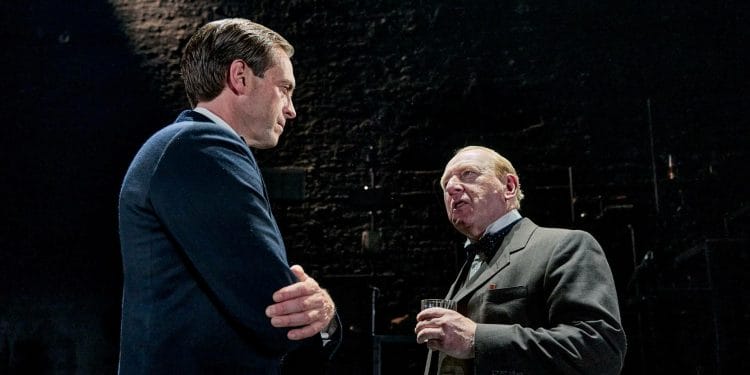 With a twenty four hour rolling news service, it’s become harder than ever for the BBC to defend its position of impartiality, and even its fiercest of supporters would concede the corporation hasn’t exactly covered itself in glory in recent months. If Jack Thorne’s new play, When Winston Went to War With The Wireless, is to be believed, this was a problem for the BBC from the very outset.
With a twenty four hour rolling news service, it’s become harder than ever for the BBC to defend its position of impartiality, and even its fiercest of supporters would concede the corporation hasn’t exactly covered itself in glory in recent months. If Jack Thorne’s new play, When Winston Went to War With The Wireless, is to be believed, this was a problem for the BBC from the very outset.
In 1926 the fledgling BBC can only broadcast news at 7pm, because there’s a fear that earlier broadcasts might damage newspaper circulation. When a general strike is called, the printing presses stop, and the only source of news is either the government’s own newspaper, The British Gazette edited by Churchill, or the wireless which younger readers will know as the radio.
The BBC to this day finds itself in a difficult position, with an aim to be non-partisan but reliant on the government of the day to maintain its funding arrangements via the license fee. At the time of the general strike, the Royal Charter was yet to be granted, and so the future of the BBC was in an even more precarious position. When Winston Went to War With The Wireless, directed by Katy Rudd, reveals just how much influence the government had over the airwaves in those early days.
The play takes a somewhat unconventional approach to the way its characters are portrayed; Haydn Gwynne plays both a studio singer and the British Prime Minister, Stanley Baldwin, and indeed most of the cast successfully multi-roll, with impressive performances from Laura Rogers and Ravin J Ganatra.
Adrian Scarborough avoids a quivering joweled caricature of Churchill, and though instantly recognisable with the help of a cigar, presents a man with ambition who is ridiculed in the corridors of power. Stephen Campbell Moore’s portrayal of Reith is so far removed from the larger than life, cantankerous Scotsman that we’re left wondering if Winston had to fight much of a war at all.
This version of Reith, so at odds with reality, is a stumbling block, because despite it being Winston’s name in the title, it’s Reith who is the central character here. We flashback to earlier days, where Reith is in a romantic relationship with a young man, and learn more about how he ended up married to Muriel. These vignettes give more shape to the man, but distract from the far more enthralling war of words between state and broadcaster.
The confrontational energy from both sides is matched with plenty of humour. Short scenes recreate some of the output of the time, from singers to musicians and comedians. Remarkably, much of it sounds like something you would still hear being broadcast on Radio 4 Extra in the present day.
The simple set is made up of a variety of objects which are used to create live foley which accompanies the action on stage. It’s a magical nod to the medium that plays such an important role in this story. Ben and Max Ringham’s sound design is bold and often surprising; a scene in the House of Commons sounds rowdily realistic, despite only a handful of characters being involved.
When Winston Went to War With The Wireless is a fascinating glimpse at two men who have shaped the history of this country, regardless of how accurate all the elements of it are, the early pioneers of the BBC would be proud to know that this is a play that mirrors the Royal Charter as it succeeds in informing, educating and entertaining.
When Winston Went to War With The Wireless is at Donmar Warehouse until 29th July 2023.
















